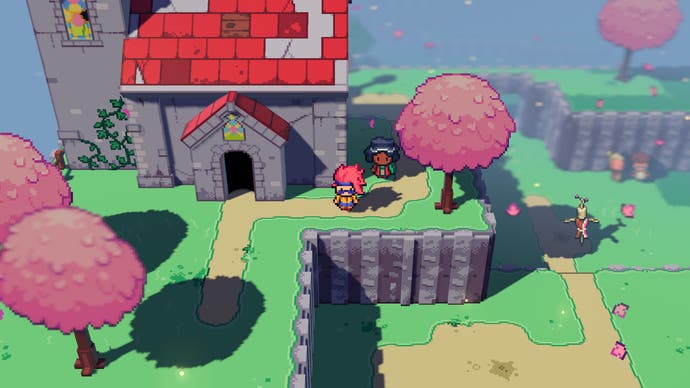Cassette Beasts review - the brilliance of Pokémon all grown up
Pop hit monsters.
Have you ever had a song that didn't click for you until you heard a remix? For me it's the Glitch Mob remix of Seven Nation Army by The White Stripes. I like the original well enough, but something about that version just hits right. Feel free to blast my terrible taste in music in the comments! It's not just the slightly hammy music analogy that makes me think about Cassette Beasts as a remix. Its similarities to Pokémon are far too blatant to just slot it into a broad monster battler genre, yet there's still enough that's new and fresh and different to make it more than a mere cover or tribute. And while I like Pokémon, I love Cassette Beasts.
The game starts with you deposited unceremoniously on New Wirral, a mysterious Arthurian isle unshackled from both time and any particular version of our reality. New Wirral's human inhabitants arrived from different times and versions of Earth, with the first reaching its shores a little over a century before the game's present. They swiftly discovered that they were not the only living creatures on the island, with dozens of different monsters roaming its environs. Some time before your arrival, it was discovered that these monsters could be recorded onto regular old cassette tapes which would allow the bearer to transform into them. Pretty good setup for some monster battling, eh?
The Pokémon influences are displayed front and centre. The game's charming visuals are the most obvious example, with sprites that look like they were ripped from Red & Blue and given a fresh lick of 2023 paint. Start a battle and you'll see that the core game elements are present and correct. You have a team of up to six monsters that can level up and evolve into different forms. Battles are turn based with each turn allowing you to use one of a monster's moves or an item. There are different elemental types with varying strengths and weaknesses when pit against each other. Heck, you even have to find and battle a number of gym lead... sorry, ranger captains, and collect their stamps of approval on a little card.
What makes Cassette Beasts great is that while it draws on much of Pokémon's existing template, it's not beholden to it either. You're almost always fighting alongside a partner who draws from the same team of six you do, so you immediately have a broader range of strategies available. Type advantages and disadvantages do more than just make attacks stronger and weaker, the interaction of different elements can bestow status effects and even temporarily change the target's type. My favourite has to be using fire attacks against a plastic type. The first attack will melt the plastic, turning it to poison, which it turns out is highly flammable, so further fire attacks will ignite the poison, causing the burn status to be applied. Helpfully, the first few times you see a particular interaction, a pop-up will explain the logic behind it, which I found made it a lot easier to remember, though you can check the type chart in your inventory at any time.
The same fresh approach can be seen as you navigate the island. Recording certain monsters will give you permanent access to new abilities, much like field moves in Pokémon, though they're attached to your character, so there's no need to keep that monster in your team. What's different here is the island itself, which is entirely open, there are no set paths or routes, so your new movement abilities are more reminiscent of a 2D Legend of Zelda title. Combining these abilities, like dashing and gliding, with simple object manipulation allows you to solve puzzles and navigate dungeons. I didn't find this side of things overly taxing, just enough that you feel a smug sense of satisfaction when you figure out one of the trickier solutions.
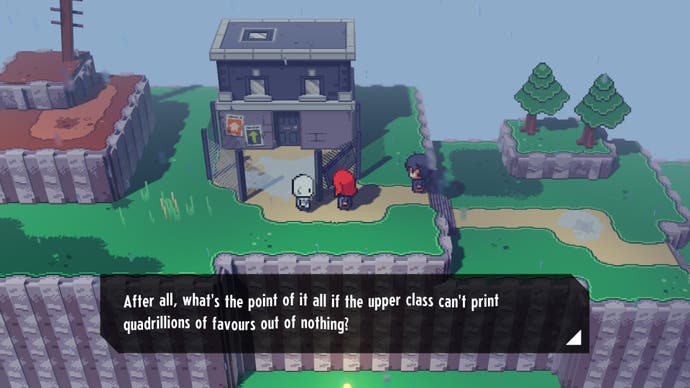
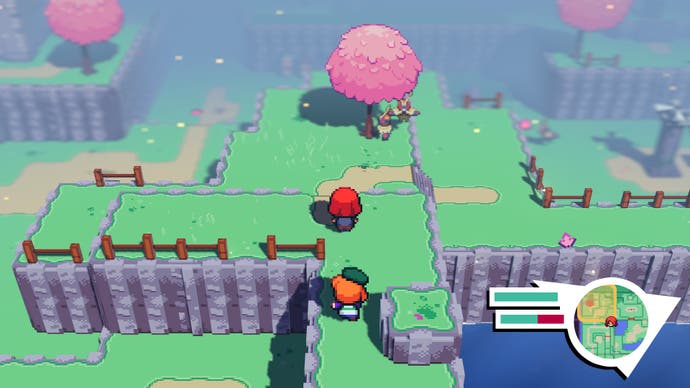
Speaking of moves, each monster can have up to eight, which includes both active and passive effects. Moves don't have to be permanently replaced, instead they take the form of stickers applied to the cassettes the monster forms inhabit. When you switch out a move, the existing sticker is peeled off and placed in your album for later use. It gives a lot of scope for customising and tweaking builds, without the need for tedious grinding. Neither are you limited in how many times you can use a move in between rests. Instead Cassette Beasts uses an action point system, with two action points gained each turn that can be spent on weaker moves or saved up for more powerful ones.
On top of all of this, you also have the ability to fuse two monsters into one during battle. Each companion character in the game has an initial quest which will allow you to fuse with them, combining into a single giant monster. The combined form gains the moves, types and action points from both monsters, as well as boosted stats, but only allows you to perform one move each round, instead of two. Along with being a single big target for your opponents, this downside means that it's not always the best course of action, as you become much more vulnerable to negative status effects.
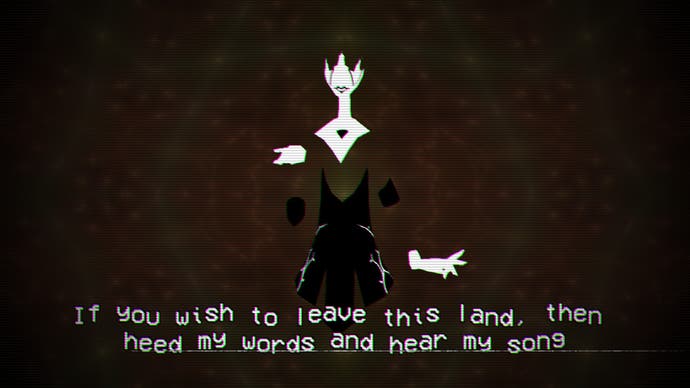
Of all the deviations from the standard Pokémon formula, the one I appreciate the most is that Cassette Beasts isn't forced to cater to younger children. While I wouldn't call the learning curve in any way steep, it does introduce more interesting mechanics at a faster pace than Pokémon's high likelihood of being a primary school kid's first game allows, which definitely helped grab me. More importantly, the protagonist and the vast majority of the characters you interact with are actually adults, which is a breath of fresh air in this kind of game. Of course media aimed at children can be entertaining for adults, but I'm well beyond the point that a game where my avatar is a literal child is going to be at all representative of me or my interests.
Cassette Beasts is a Pokémon game that has grown up with you. I'm not saying it's a work of startling maturity and heavyweight intellectualism, but it doesn't condescend. It makes jokes about estate agents and philosophers. It enjoys retro 90s shopping mall aesthetic and physical mixtapes, ironically or otherwise. It has read books that aren't in the Young Adult section! This comes through most prominently in the game's main plot about leaving the island, a quest that requires the hunting down of several Archangels, boss monsters that appear to embody negative elements of the human psyche and are rendered in a variety of art styles to convey their reality-warping power, a visual trick that will always get a thumbs up from me.
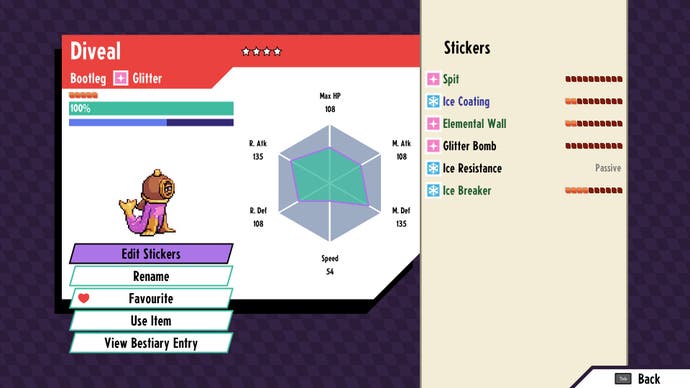
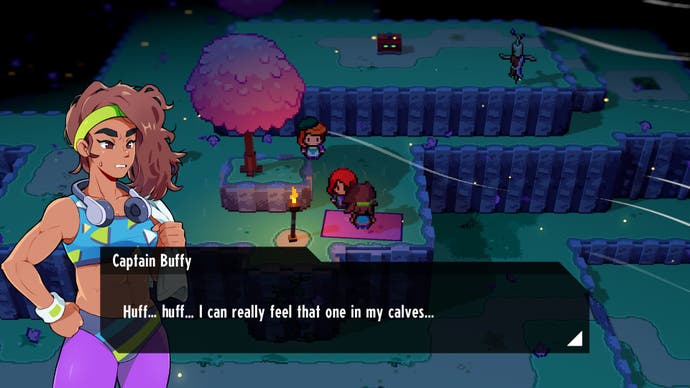
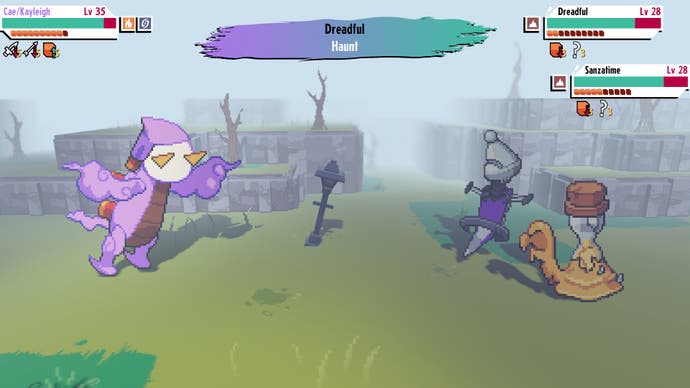
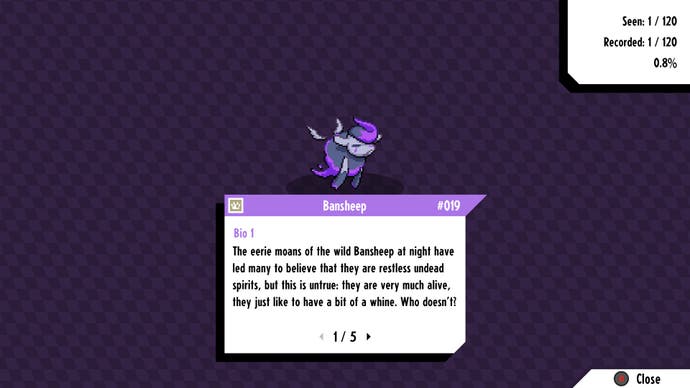
My earlier invocation of Arthurian legend wasn't incidental. The Archangels, like many of the monsters and other elements of the game, draw from literature, history and folklore, mostly of the British Isles. It's nice, playing something that is very much a product of Britain without all the unpleasant jingoism and whatnot that so often accompanies such things. Cassette Beasts is unashamedly British, but it's also queer, anticapitalist and multicultural, and it's a combination we don't see often enough.
It would be incredibly remiss of me to review a game called Cassette Beasts without mentioning the music, which is absolutely lovely. I particularly enjoy how the theme in the island's main settlement of Harbourtown shifts between vocal and instrumental versions as you move in and out of buildings.
I'm genuinely struggling to find anything negative to say about Cassette Beasts. It crashed once in over 20 hours of play, but that's it. If you're a Pokémon fan, you absolutely need to play this game and even if you aren't, I still want to evangelise for it. Cassette Beasts is a lesson in how to make a game that is delightful, cosy and brimming with nostalgia without being condescending towards your adult audience.
